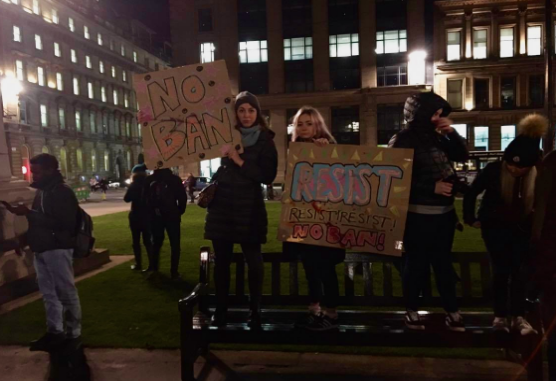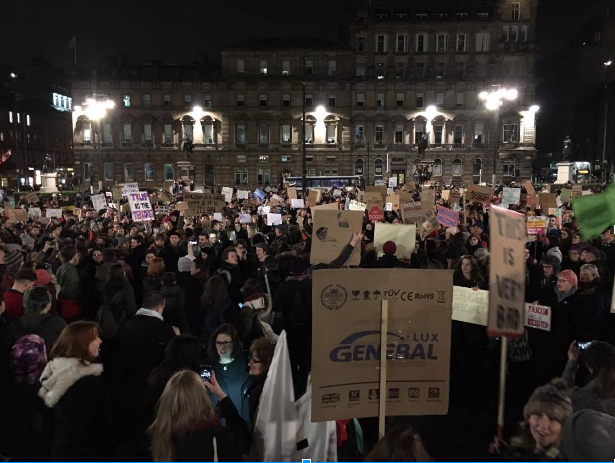
On Friday 27 January President Trump signed an Executive Order banning citizens temporarily from seven Muslim-majority nations from entering the US. The order also includes refugees, who are banned from entering the country for 120 days.
The backlash has been global. Many foreign leaders publicly denounced Trump’s decision and hundreds showed up at airports across the US in protest. Sir Mo Farah proclaimed that “the Queen made me a knight, Donald Trump made me an alien.” Thousands joined protests across the UK condemning the ban but also to criticise Theresa May for defending the decision to host Donald Trump on a state visit. In reference to the ban, May insisted that the “UK takes a different approach.” This was not enough. 1.5 million people and counting have signed an e-petition to prevent Donald Trump from coming to the United Kingdom.
The UK government introduced e-petitions to their website in November 2006. Before this, petitions were directed to departments of the government instead of MPs, and just over 30 were actually debated over the course of four years. Now, if a petition exceeds 100,000 signatures, a cross-party committee of MPs reviews it in order to consider it for parliamentary debate. On 20 February, MPs are set to debate on whether Trump’s visit should go forward.
As the political landscape is continually shifting in a direction many of us are not comfortable with, we need to recognize our political potential as a civil society. There is so much power in groups of people expressing love and solidarity towards those being marginalised. It is so refreshing to see young people so politically motivated to oppose their governments, to educate themselves on the affairs of the state and to have open debates about issues we are currently facing. Social media has become an amazing place for both discussion and organisation.
On Friday evening, when the news first broke out about the Executive Order, I logged onto my Facebook and got my first look at how fellow immigrants were reacting. Nada Eldaief, a friend of mine, posted about her own experience:
“Almost 30 years ago, my Egyptian father immigrated to the US. He held a full time job, was a full time MBA student and simultaneously applied to hold a Green Card. He has worked tirelessly to provide for his family, pays incredulous amounts of taxes and has advocated for the American values that allowed him to successfully build his career and send his three children to college. He, like millions of others, defines what being an immigrant is all about. Today, I’m not sure that many other Middle Eastern men or women have the same opportunity.” – Nada Eldaief
I only moved to Glasgow a year and a half ago, but have lived as an immigrant for most of my life. Naturally, the idea of anyone being banned from a country because of where they were born struck a chord with me. But what really made me want to demonstrate against this Muslim ban was the neighbourhood I moved into when I started my second year of university. Below my flat is a 24 hour shop owned by a Muslim family and to the right of my building is a Christian Korean church.
Turning the corner I pass by a primary school, which on days when I go to uni early enough, I pass by kids being dropped off. The scene is total chaos with a mixture of languages, accents and races all trying to get past the small gates. My Scottish flatmate jokes that this must be the only place in Glasgow where she’s the minority. On the day of a Scotland vs England match, I saw so many little boys and girls wearing some sort of Scotland gear to school.
I’ve never felt completely alien in any part of Glasgow, but I undoubtedly feel the most at home in this particular melting pot, one in which none of us feel like we really belong but will try our best to. Everyone knows a little something about one another’s culture and has the upmost respect for that which is different. I love that I can buy halal meat or tapioca flour or Indian mangos within a 30 metre distance of the other.
On Monday night in Glasgow, an emergency protest was organized in the city center to slam the Muslim ban. Amongst chants of “Donald Trump get tae fuck” and countless signs calling Theresa May a “wee snake”, a crowd of predominantly young people stood in solidarity with those who are being belittled by the leader of the “free” world. A friend of mine was walking from her flat to the demonstration, and heard two men in their mid twenties, upon hearing the chanting, loudly exclaimed that there was nothing wrong with immigration reform and that this city was full of “fucking socialists”. Either way, it was predicted that around 500 people, angered by this divisive immigration reform showed up that night in a city in which 17 percent of the population belongs to an ethnic minority.
After a failed attempt at independence in 2014, an uncertain post-Brexit future with 62 percent of Scottish voters wanting to remain, and rising unemployment, Glasgow has become increasingly politicised. For Scotland, the first-past-the-post system does not deliver the results that the actual population is voting for and people are frustrated. The rise in popularity of the Scottish National Party has fostered some hope, but Holyrood is not even granted permission from Westminster to be consulted before triggering Article 50. Regular demonstrations, which range from anti-racism protests to “Reclaim the Night” marches and “Refugees are Welcome” campaigns are held at George Square in the city center and are an opportunity for people, especially young ones, to publicly express their concerns.
Just as our parents’ generation was heavily influenced by the events of the Cold War, we as millennials live in a post 9/11 world. We cannot accept something as dangerous as a Muslim ban in the world’s most powerful country go by uncontested. So attend demonstrations, hold discussions and hold your leaders accountable. If you’re one of the people whose excuse for inaction is that supposedly almost 2 million people in the UK marched against the Iraq War to no avail, know that as a citizen of the world you have a civic duty to care. Most importantly, I hope others can also see hope in the amount of young, educated and open minded people trying to make their voices heard.
Marches you can attend across the UK in the next few weeks:
London:
Protest: Stop Trump’s Muslim Ban and Stop May Supporting It – Saturday 4 February
Stop Trump: nationwide day of action – Monday 20 February
Edinburgh:
March Against Muslim Ban – Saturday 4 February
Manchester:
Manchester Against Trump’s Muslim Ban – Saturday 4 February
Stand up to Racism: Say No to Trump’s Muslim Ban – Saturday 4 February
Leeds:
United Leeds Against Trump’s Muslim Ban – Saturday 4 February
Anti Trump, Anti Racism Protest – Saturday 4 February
Belfast:
Belfast Anti-Trump Protest – Saturday 4 February
Liverpool:
Stand Up To Racism Rally – Sunday 19 February
Oxford:
After Brexit, After Trump’s Election: Stand Up To Racism – Thursday 16 February
Glasgow:
Tell Theresa May: Defend Migrant Rights, Refugees Welcome Here – Saturday 4 March










